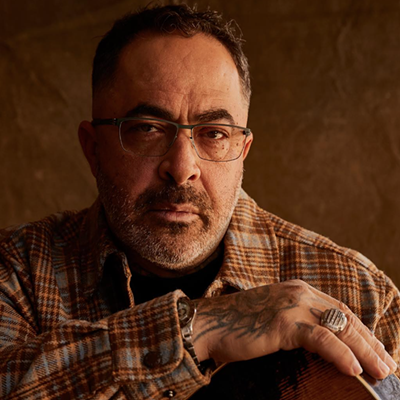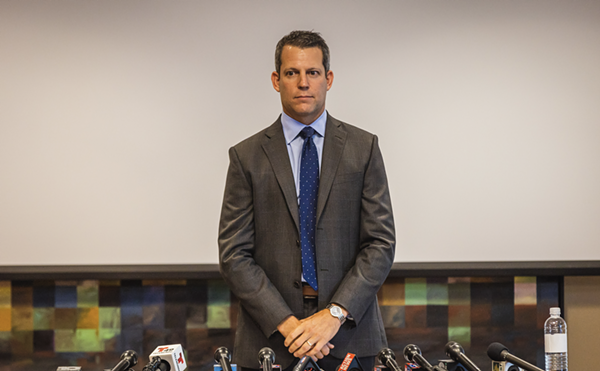"It was some years later that I realized what my [OCD] was — I was watching Oprah," says Traig. "I knew I'd been crazy, but I didn't know the name of the disorder. It was such a specific form of OCD — Religion! Religion! Religion! — but it wasn't until I started my book that I knew that it was called 'scrupulosity.' "When I found these stories, I was convinced I was looking in a mirror. I thought I was the only one, and then I found that it wasn't at all unusual."
Traig is of the opinion that religions big on symbolism and ritual — Islam, Judaism, Catholicism — are more likely to incubate OCD sufferers than other, more reflective ones.
"I've never heard of a scrupulous Buddhist," Traig says. "The more you have to do, the easier it is to fall into. It became apparent early on that this priest I know was scrupulous. He would get into such a lather over the crumbs of the communion host, and would spend an inordinate amount of time 'raking down' the host, afraid he was wasting a crumb of it.
"I'm still not perfect," she continues. "I check a little, and I have my little quirks. [But] as long as it's less than 30 minutes a day, I'm not going to go on medication. That's my rule. But once you know what it is, it's easier to detach yourself — 'That's the third time I've searched for my wallet, and it's right here. That's OC. Now stop it!'"
How do you get relief from the effects of OCD? At this point, two things have been shown to help sufferers of the disease: self-awareness of the compulsions, whether through therapy or meditation, and something called serotonin reuptake inhibitors (SRIs). According to the Journal of the American Academy of Child and Adolescent Psychiatry, "SRIs are the only medications superior to placebo in the treatment of OCD." Interestingly, Jack Nicholson's character in As Good As It Gets is the only character in pop culture who has used a drug-related treatment. When he says near the end of the film that "50 or 60 percent" of OCD sufferers respond to drugs, he's not just whistling Dixie (over and over).
Experts aren't sure where the disease comes from, but current research seems to suggest that molecular causes could be a factor, with one study suggesting that OCD could be triggered by strep infections.
"It's a medical disease, not a psychological disease," explained Dr. Suck Won Kim, associate professor of psychiatry at the University of Minnesota, to the St. Paul Pioneer Press. "Most people will never understand OCD and how serious it is. It's so foreign to people. Experts all agree that there is no evidence of a major psychological contribution to this disease.
"There is evidence that untreated OCD gets worse," Kim continues. "Some of these people become reclusive, like Howard Hughes, who had the worst case of OCD ever known. Can you imagine the torture they have to go through living their whole lives and having to, for instance, walk five steps backward every time they walk seven steps forward? These rituals are torture for them. With treatment, they function very well. Untreated, they are miserable all of their lives."
Dr. Schwartz of UCLA suggests that drug treatments aren't innately any more effective than a "pull up your bootstraps" mental approach that focuses on what he calls "The Four R's": Re-label, Reattribute, Refocus and Revalue. Schwartz also says that catching the disease early in life is a key to changing compulsive behaviors.
"I keep developing the psychological model — so in that way, the treatments are improving. The way to do cognitive behavioral therapy is in some ways improving — unlike the drug research, in many ways — because our concept of mindfulness is becoming more readily explainable, and the relationship between mindfulness and biology is getting much clearer. I think this is making mindfulness more accessible, and so in that way I'd say the treatment is improving. I don't think it's improving in any way that involves drug treatment.
"I haven't heard about it in the last couple of months," he continues, "but for the last year or two, I was really worried that they were going to do brain implanting with electrodes for people with OCD. They would do it if they could get away with it. I'd like to create a public awareness that that's not a good thing. There is just no big change in drug treatment. The drug treatment is the same as it always was. SRIs are still the main pharmacological treatment by far, but they're limited for a lot of people. There's been some slow progress with using brain surgery, making small lesions in the brain for people with OCD. The people who push these things, especially the brain implants, have their own agenda. It involves drilling a hole in the skull. It's very serious business. But they don't treat it as seriously as one would think."


















